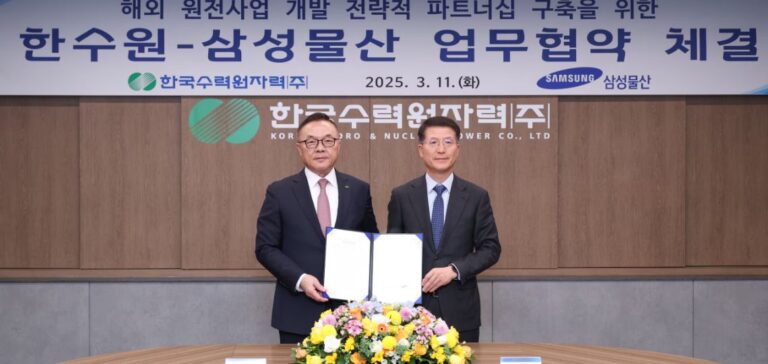KHNP (Korea Hydro & Nuclear Power) and Samsung C&T have signed a strategic partnership designed to enhance their competitiveness on international civil nuclear markets. The agreement stipulates joint cooperation on global tenders for conventional nuclear power plant construction, as well as initiatives involving Small Modular Reactors (SMRs). This collaboration is primarily aimed at addressing emerging market opportunities in countries that are increasingly turning toward smaller reactor technologies as alternatives to traditional nuclear reactors.
Focus on emerging markets in the Asia-Pacific region
The partnership between KHNP and Samsung C&T includes the joint development of commercial proposals for upcoming international tenders. In particular, the companies will focus on specific initiatives related to SMRs, an emerging technology well-suited to address the evolving energy needs of countries seeking alternatives to conventional large-scale nuclear reactors. Both firms plan to leverage their combined expertise in nuclear plant operations and the delivery of large-scale infrastructure projects to enhance their competitive position in the global nuclear energy sector.
The agreement comes amid a shifting global energy landscape, where increased flexibility and adaptability to national energy policies are essential. KHNP and Samsung C&T have chosen to adopt a joint approach to better address the specific requirements of countries potentially interested in their proposals, notably in the SMR segment, viewed as easier to integrate into existing grids.
Expanding presence in European nuclear markets through SMRs
KHNP recently signed memorandums of understanding (MoU) with Norsk Kjernekraft in Norway and Kärnfull Next in Sweden to strengthen its European presence using its innovative SMR (i-SMR) technology. These preliminary agreements demonstrate a clear intent to expand their presence in Europe, where national energy markets show increasing interest in small modular reactors due to their flexibility and adaptability.
Samsung C&T has also initiated similar steps by signing a memorandum of understanding with Kärnfull Next to advance SMR deployment in Sweden. The company previously participated in building traditional nuclear power plants internationally, notably at the Barakah nuclear plant in the United Arab Emirates. This strategic alliance reflects a significant shift in strategies among major nuclear players, responding directly to ongoing transformations in the global nuclear market.
Strategic evolution driven by global market trends
This strategic alliance between KHNP and Samsung C&T reflects an adaptation to current global market trends in the nuclear sector, emphasizing flexibility, cooperation, and technological adaptability. This approach is designed to help both companies maintain or enhance market share amid increased competition, especially in emerging markets, where collaborative business-to-business (B2B) models are becoming increasingly prevalent.
Such alliances may set a precedent, encouraging similar strategic cooperation across the nuclear industry, as companies must adapt to rapidly evolving global market expectations.






















